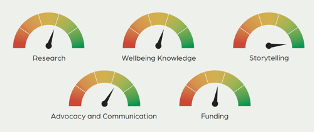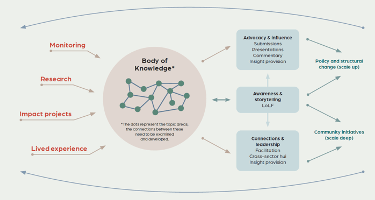At its Annual Plan hearings and deliberations in early 2024, the WEL Trust resolved to continue funding the Waikato Wellbeing Project, subject to “a robust review of future funding models and project deliveries.”
We contracted Natalie Richards of Versus (www.versus.co.nz ) to undertake the review, which was completed in February 2025. The review was conducted in late 2024 using a qualitative data collection approach. A total of 36 people participated in the review, including funders, capital beneficiaries, the WWP governance members, and stakeholders. You can read the full review report here.
The headline conclusions of the review are:
The WWP has achieved solid results for most deliverables, with the strongest results derived from the storytelling function. The review summarises performance against our key strategic areas in the following illustration.
The review uncovered mixed feedback in the funding space, with some funders reflecting on the project’s positive achievements while others challenged the value that the WWP has delivered.
When the deliverables are considered together, the WWP has generated several benefits for the region, particularly to the community sector. The WWP has been easy for the community to access and the work and has started to build cross-sector relationships. Importantly, this project provides independent research that will grow as the WWP matures and embeds itself in a wider range of topics.
Despite the positive results, the WWP has faced challenges implementing its work. The WWP has sometimes lacked clarity around its role and deliverables; the areas it focuses on have changed over time, and the SDGs’ relevance to the Waikato Region have also been challenged. The WWP has also faced questions about the change or impact that its work had delivered, both at policy and community levels. Furthermore, the role of key supporting functions for the project (Kaitiaki Advisory Board and Manu Taki) do not appear to have yielded the benefits that were originally intended.
Despite these challenges, the community welcomes the project, and most stakeholders state the WWP has the potential to benefit the region significantly. To build and grow the work the WWP has completed to date, the WWP will need to make changes to its structure, accessible skill sets, and engagement practices.
To truly leverage the insights it develops, the WWP needs to find avenues to scale its work upwards to affect policy and structural change and determine how it can scale deeply to better support community initiatives. Additionally, the WWP will need to develop a broader funding base and use a combination of funding sources to deliver its work in the future. The diagram below illustrates the different options for the WWP to take.
Next Steps
The report provides a thorough and well-rounded assessment of the achievements and strengths of the project, and the opportunities for further improvement. The WWP team and the Kaitiaki Advisory Board fully support these findings, while noting that regional wellbeing is a collective responsibility.
As our funding is finite, we need to consider next steps. As well as getting on with our current work programme, we will shortly begin a process to explore options for the next stage of the WWP. If you would like to be part of this process, please get in touch at Contact | Waikato Wellbeing Project
Providing the 2025/26 WEL Trust annual plan is approved as drafted, our current funding is sufficient for us to continue until mid-2026. Durin this period we will collectively identify and explore options for the WWP, and for any funding agreements to be reached- be they national, regional, local, public, iwi, private and philanthropic. We are completely open to different operating models if they help advance wellbeing and are fully supported.



